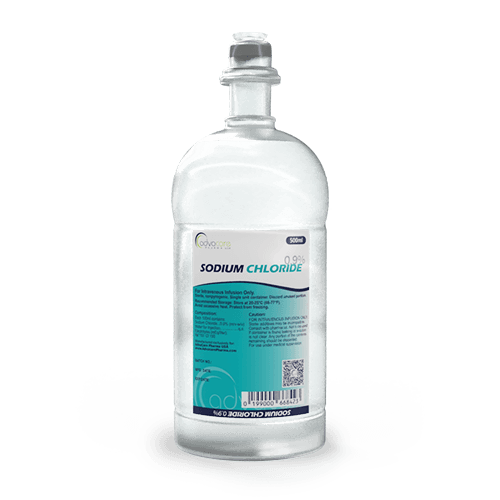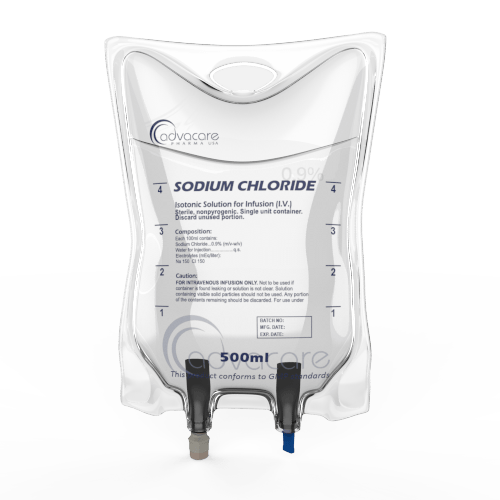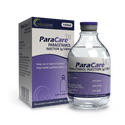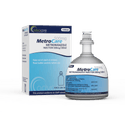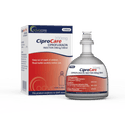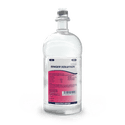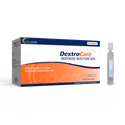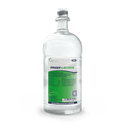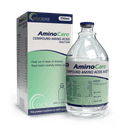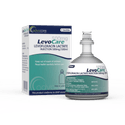- Home›
- Pharmaceuticals›
- Injections›
- Large Volume Injections›
- Saline Injection
Saline Injection
Dosage
Packaging
What is Sodium Chloride?
Active Ingredients: Sodium Chloride
Saline (Sodium Chloride) Injection is a sterile non-pyrogenic solution used as an intravenous rehydration therapy for electrolyte replenishment. It is used to supply water and salt (sodium chloride) to the body. This injection may also be used with other compatible drugs for total parenteral nutrition.
Sodium chloride (NaCl) is a salt that is needed for many normal bodily functions. Sodium is essential for water distribution, fluid balance, and osmotic pressure of body fluids. It is also needed to help regulate the acid-base equilibrium of fluids within the body. Chloride is necessary for the metabolism of sodium and it also affects the acid-base balance of the body.
This saline solution contains no antimicrobial agents or added buffer, and the pH ranges from 4.5 to 7.0, dependent on the container size. Saline (sodium chloride) is available in concentrations of 0.45% and 0.9%.
Each 100mL of Saline 0.45% Injection contains 4.5g sodium chloride (NaCl) in water for injection. It contains sodium (Na+) 77mEq/L and chloride (Cl-) 77mEq/L. The osmolarity is 154 mOsmol/L (calc).
Saline 0.9% contains 9g/L of sodium chloride (NaCl) in water for injection. It has an osmolarity of 308mOsmol/L (calc). It contains 154mEq/L sodium ( Na+) and 154 mEq/L chloride (Cl-).
This injection has been manufactured as a sterile, single-dose container for intravenous administration. It is available in 4 sizes of single-dose containers: 100ml, 250ml, 500ml, and 1000ml.
AdvaCare Pharma produces a range of saline products, including Glucose Saline Injection, which is ideal for parenteral replenishment, and Sodium Chloride Irrigation Solution, which has been specially designed as an irrigation-specific product. Saline Nasal Spray is also available for distribution.
AdvaCare Pharma is a manufacturer and supplier of Saline (Sodium Chloride) Injections. Every part of our supply chain is thoroughly vetted to ensure it meets health, safety, and environmental standards. This drug is produced in our GMP-certified facilities in China, India, and the USA.
Why are we a quality Sodium Chloride manufacturer?
AdvaCare Pharma is a leading manufacturer of Saline (Sodium Chloride) Injection. For 20 years, we have been in the business of manufacturing GMP-approved high-quality, affordable pharmaceutical injection products to improve healthcare worldwide. Our control of the supply chain is data-driven and methodical, supported by highly skilled teams of professionals.
As a large-scale Saline (Sodium Chloride) manufacturer, we supply pharmaceutical distributors, hospitals, pharmacies and other medical organizations in more than 65 countries.
Uses
What is Saline (Sodium Chloride) used for?
It is used as a rehydration therapy for electrolyte replenishment. It is used to supply water and salt (sodium chloride) to the body. It is also capable of inducing diuresis in certain patients. Saline is used as a vehicle or diluent for compatible drugs for intravenous administration.
Saline 0.45% is sometimes used to assess the kidneys, as more water is provided than necessary for salt excretion. It is also used to treat hyperosmolar diabetes when dextrose is not advised and there is a requirement for large amounts of fluid without excess sodium ions.
Saline 0.9% is also used for the treatment of metabolic alkalosis when present with fluid loss and mild sodium depletion. It is also used as a priming solution in hemodialysis procedures, and it may be used to start or finish blood transfusions without hemolyzing red blood cells.
Is Saline Injection used in emergency medical situations?
Saline Injections are commonly used for emergency medical situations. Saline solutions can be used for fluid resuscitation, medication administration, or to establish and maintain intravenous access to the patient's bloodstream. It may also be used for emergency diagnostic procedures, such as a saline infusion sonohysterography. Saline is typically preferred because it is isotonic and has a similar salt concentration to bodily fluids. This can help reduce the risks of complications during intravenous use.
How should Saline (Sodium Chloride) Injection be used?
This medication is manufactured as a solution, which should only be administered by a doctor or healthcare provider.
The saline solution should be carefully examined for signs of discoloration or any particulate matter. Any compromised containers should be discarded, and the medicine should not be used if the seal is not intact or if it is past the expiry date.
Some additives may be incompatible with Saline Injection. The aseptic techniques should be used when introducing additives. The solution should be mixed thoroughly and used immediately. Do not store the solutions containing additives.
When using a smaller dose, any unused solution should be discarded.
Do not use plastic containers in series connections, as this may result in air embolism. Pressurizing intravenous solutions in flexible containers is also known to increase the flow rate, which may result in air embolism. It is also important to note that a vented IV administration set with the vent open could result in air embolism.
How should Saline Injection be stored?
It is recommended to store unused Saline Injections in a location that is 20-25°C. The solution should be protected from freezing.
What dose should be given?
For isotonic extracellular dehydration in adults and adolescents, the usual dose is 500ml-3L per 24 hours. For pediatric patients, the usual dose is 20 to 100ml per 24h, depending on body weight.
The usual infusion is dependent on the clinical condition, but is typically as follows:
- adults, including elderly patients: 40ml/kg in 24 hours
- adolescents: 40ml/kg in 24 hours
- children: 2-8ml/kg per hour
The exact dosage and infusion rate will be determined by a physician, as it is dependent on many factors, including age, weight, clinical condition, and laboratory determinations. During treatment, it is necessary to monitor changes in blood glucose and electrolyte concentrations to update dosage and to monitor fluid and electrolyte balance during prolonged parenteral treatment.
When used as a diluent, the infusion rate will be determined by the added medical products. The usual dose is 50-250ml per dose of medicinal product.
Refer to a doctor or pharmacist for guidelines on dosage. Do not exceed what they advise.
Who can use Saline?
Saline Injection can be administered to adults and children, but caution is advised for specific groups of patients.
Pregnant Saline Injection should only be administered to a pregnant woman if there is a clear need. There have not been animal studies done in regard to reproduction. It is unknown if this medication may cause fetal harm or if it affects reproduction capacity.
Breastfeeding It is not known if this medication is excreted in milk. As it is known that many drugs are excreted in human milk, caution is recommended when administering this drug to nursing women.
Children The safety and effectiveness of this medicine has not been established for children. It should be noted that electrolyte solutions are used for pediatric patients, and to follow any warnings or precautions as indicated.
Geriatric There are no recorded clinical differences in response for this population. It is recommended to exercise caution when selecting a dose, as elderly patients have a higher frequency of hepatic, renal, or cardiac dysfunction.
What symptoms are associated with an overdose of Saline?
An excess of sodium in the body is associated with symptoms such as nausea, vomiting, diarrhea, stomach cramps, thirst, sweating, fever, increased heart rate, high blood pressure, kidney failure, peripheral/pulmonary edema, respiratory arrest, headache, dizziness, irritability, weakness, muscle twitches/rigidity, convulsions, coma, and death.
Other warnings
For patients with impaired renal function, it is recommended to monitor renal function, as this drug is known to be excreted largely by the kidneys. Therefore, toxic reactions may be more likely to occur.
For patients with congestive heart failure, severe renal insufficiency, or in clinical states with sodium retention with edema, solutions with sodium ions should be administered with great caution, if at all.
Intravenous therapy with saline could result in fluid and/or solute overloading due to the dilution of serum electrolyte concentrations, overhydration, congested states or pulmonary edema.
Side Effects
As with all pharmaceuticals, some unwanted effects can occur from the use of Saline (Sodium Chloride) Injection.
Some side effects that may occur due to the solution or administration technique include, but may not be limited to:
- febrile response
- infection at the injection site
- venous thrombosis or phlebitis extending from the injection site
- extravasation
- hypervolemia
Common side effects include, but may not be limited to: • redness at the site of injection
Serious side effects may include:
- swelling of the hands, ankles, or feet
- trouble breathing
- muscle cramps
- weakness
For a comprehensive understanding of all potential side effects, consult a medical professional.
If any symptoms persist or worsen, or you notice any other symptoms, please call your doctor immediately.
Precautions
Do NOT use Saline (Sodium Chloride) Injection if:
- You are hypersensitive to any of the ingredients.
- You have any allergies.
- You have hypernatraemia or hyperchloraemia.
Before treatment, consult your doctor regarding any medications you are taking to address potential drug interactions.This drug is known to interact with drugs such as corticosteroids or corticotropins. Drugs that affect fluid/electrolyte balance, which increase the risk of hyponatremia, and lithium are also known to interact.
This medication may not be suitable for people with certain conditions, so it is important to consult with a doctor if you have any health conditions. Some conditions, such as a medical history of kidney problems, heart problems (such as heart failure), and body water/salt imbalance may need additional considerations such as dose adjustments or monitoring.
References
The Prevalence and Indications of Intravenous Rehydration Therapy in Hospital Settings: A Systematic Review
This systematic review aimed to investigate the prevalence of intravenous (IV) rehydration therapy in hospital settings, categorized by patient groups and populations. It included a comprehensive review of major databases and grey literature from their inception until March 28, 2022.
A total of 29 papers met the inclusion criteria. The prevalence of IV rehydration therapy in pediatric patients ranged from 4.5% (hospitalized with diarrhea and dehydration) to 100% (admitted to the emergency department with mild to moderate dehydration due to viral gastroenteritis). In adults, the prevalence ranged from 1.5% (single substance ingestion of modafinil) to 100% (hospitalized with hypercalcemia). The most common reason for IV rehydration in pediatric patients was dehydration from gastrointestinal fluid loss, with other causes including malnutrition, neuromuscular disease, bronchiolitis, and influenza. In adults, the indications included fever, diarrhea, drug intoxication, hypercalcemia, cancer, and postural tachycardia syndrome.
The conclusion of this study is that IV rehydration therapy in pediatric patients is primarily used to treat dehydration and diarrhea, while in adults, it has a wider range of applications.
You might be interested in...
Why AdvaCare Pharma?
As an industry leader, we are aware of our responsibility to provide affordable and sustainable solutions to improve healthcare worldwide.
